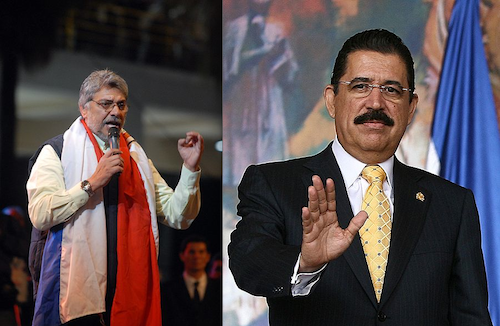From Honduras to Paraguay
by Horacio Castellanos Moya / July 5, 2012 / No comments
Two ways to remove a defiant President from office
The impeachment of leftist Paraguayan president and former Roman Catholic bishop Fernando Lugo is the latest evidence of how weak and vulnerable democratic institutions in some parts of Latin America can be. It also marks the appearance of a new political map on the continent.

- Corkscrew is focused on Latin American issues. Literature, journalism and politics are the main concerns of this column. A corkscrew is useful only if it opens a bottle, hopefully full of something that would enlighten our spirits, but we could also set loose a cruel Genie or a rotten wine. The author will follow this principle: look for topics that open debates, new perspectives, and controversy. Cheers!

- Horacio Castellanos Moya is a writer and a journalist from El Salvador. For two decades he worked as a journalist in Mexico, Guatemala, and his own country. He has published ten novels, five short story collections and two books of essays. He was granted residencies in a program supported by the Frankfurt International Book Fair (2004-2006) and at City of Asylum/Pittsburgh (2006-2008). In 2009, he was a guest researcher at the University of Tokyo. Currently he teaches at the University of Iowa.
On June 22, Lugo was removed from office by the Paraguayan Senate with the support of 86% of its members in an expedited trial where he was accused of mishandling a dispute with rural campesinos that left 17 people dead. The hasty process could only have been orchestrated by a well-oiled conspiracy. Lugo was then replaced by the vice president, Federico Franco, a member of a faction of the traditional Liberal Party that governed Paraguay for 61 years, including the 35-year dictatorship of General Alfredo Stroessner. Franco and his new government have not yet been recognized by the Union of South American Nations (UNASUR), which referred to the impeachment proceedings as a “breakdown of democratic order.”
Lugo’s removal has been compared to the June 28, 2009 coup d’état against Honduran president Manuel Zelaya. Although both were instances of institutional breakdown and setbacks to democracy, and both presidents became isolated from their political allies, there are differences in the developments surrounding each case.
Zelaya was ousted by a military coup as he was calling a referendum (against the will of the Congress, the Supreme Court, the Electoral Tribunal, and his own Liberal Party) to approve a change to the constitution that would have allowed him to be reelected. Lugo, on the other hand, had only nine months remaining in his term and was making no bid to be reelected. The Liberals may have removed him from office in an attempt to gain the upper hand in the upcoming elections.
The Honduran army beat Zelaya, tied him down and sent him into exile in Costa Rica. While the Paraguayan military has played no active role in Lugo’s removal from office (no apparent one, at least) and he left the Presidential Palace without violence and remains in Paraguay as the leader of a peaceful resistance.
Even the personality traits contributing to the political isolation of both presidents are dissimilar. Zelaya was a rich landowner-turned-progressive-politician from a traditionalist party, with a sanguine and messianic personality comparable with Hugo Chávez’s in Venezuela. Lugo was a Roman Catholic bishop with close ties to liberation theology who left the priesthood in 2004, started a new political movement, and after assuming the presidency had to battle lymphatic cancer and devote part of his term in office to defending himself against paternity suits (involving relationships conducted while he was still a priest). Lugo was also overly indulgent of his political enemies, upon whom, according to his advisors, he “looked with great kindness, as if they were his parishioners instead of his rivals.”
What’s undeniable is that the exit of both presidents means the return of the traditional, conservative Right in both countries, which has altered the geopolitics of the region: The overthrow of Zelaya halted the expansion of the bloc of countries headed by Chávez, while the removal of Lugo has embedded a conservative government in the middle of a bloc of nations led by the moderate left (Brazil, Argentina, and Uruguay).
These two ways to remove a democratically elected president have repeated themselves throughout the history of Latin America. Who’ll be next?
Translation: Sam Cogdell





